He is Favored 19
Scourged Everyone
At that time therefore the Javelin took hold of the Salvation, and he scourged.
And the Soldiers, those who braided/plaited together a wreath-crown from out of thorn bushes, assaulted/imposed upon the Head of himself, and are throwing around himself a purple outer garment.117b
Slapping Himself with the Left
and they kept coming toward himself, and kept saying, "Rejoice! The King of the Casters!" And they kept giving to self palm-slaps.And the Man of the Spear came outside backwards, and he is speaking to themselves, "Behold! I am leading himself to yourselves outside so that you might recognize that I am finding not even one cause within himself!
Look at Yourself!
Therefore the Salvation came out outside, he who bears habitually the Thorny Wreath and the Purple Garment, and he is saying to themselves, "Behold! the Man!"
"For what cause is your clothing red? And the garments of yourself like he who treads within the Winepress?" (Isaiah 63:2 RBT)

When therefore the Arch Priests perceived himself, and the Under-rowers, they howled, those who are saying, Stake! Stake!
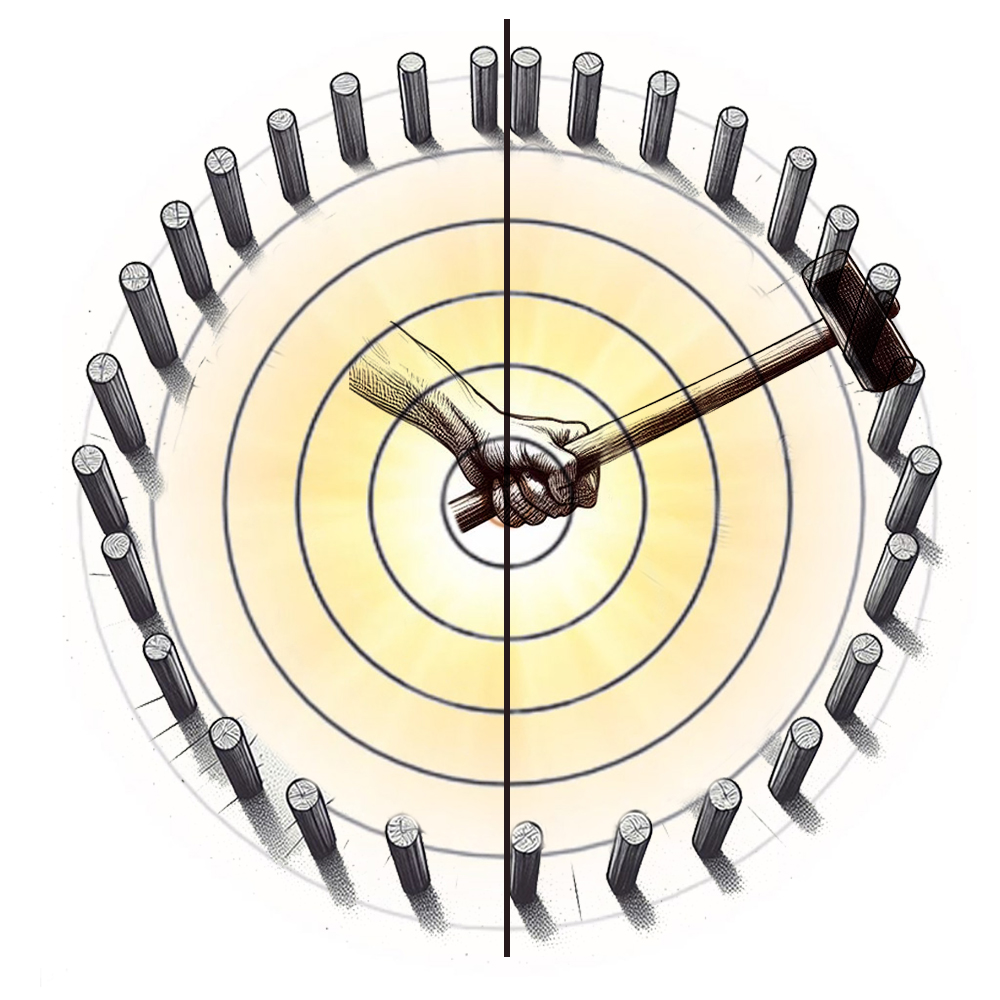
σταυρόω, to fence with stakes, drive down stakes, fortify with stakes, palisade. Cf. Strongs #4717.

We Hold a νόμος, Usage/Custom
The Casters separated to self, "We, ourselves are holding a usage. And according to the Usage he is indebted to die away because he made his own self a son of a God!"When therefore the Man of the Spear heard this one, the Logos Ratio, he was put to flight even more.
And he entered into the Headquarters backward and he is speaking to the Salvation, "Where are you from?" but the Salvation did not give a separation to self.
To Be or not To Be, To Live or Not to Live?
The Man of the Spear is saying therefore to self, "You are not talking to myself. Do you not see that I am holding an authority to set you free, and I am holding an authority to stake you?"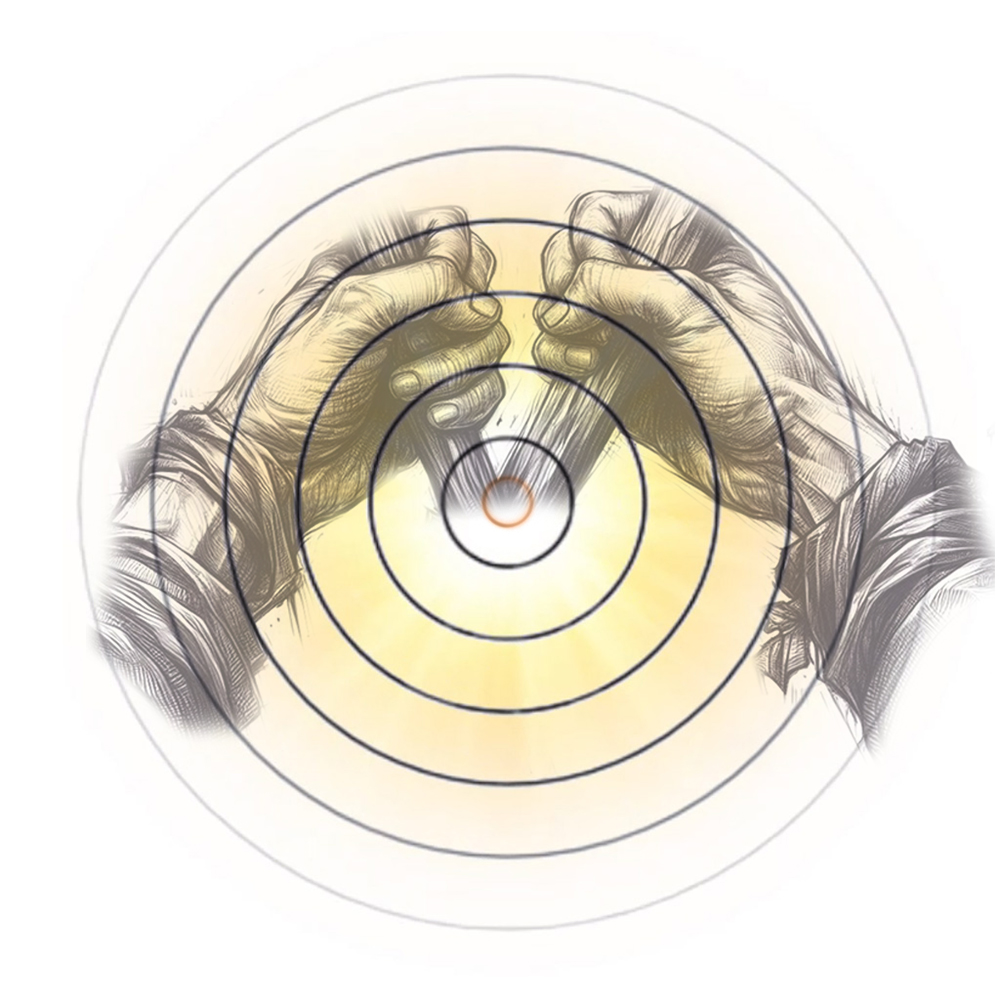
A valley of decision.
Salvation separated to self, "You were not holding an authority according to myself, not one, except she was being that which is given to yourself from above. Because of this, the one who hands over myself to yourself, he is holding a more mega miss!
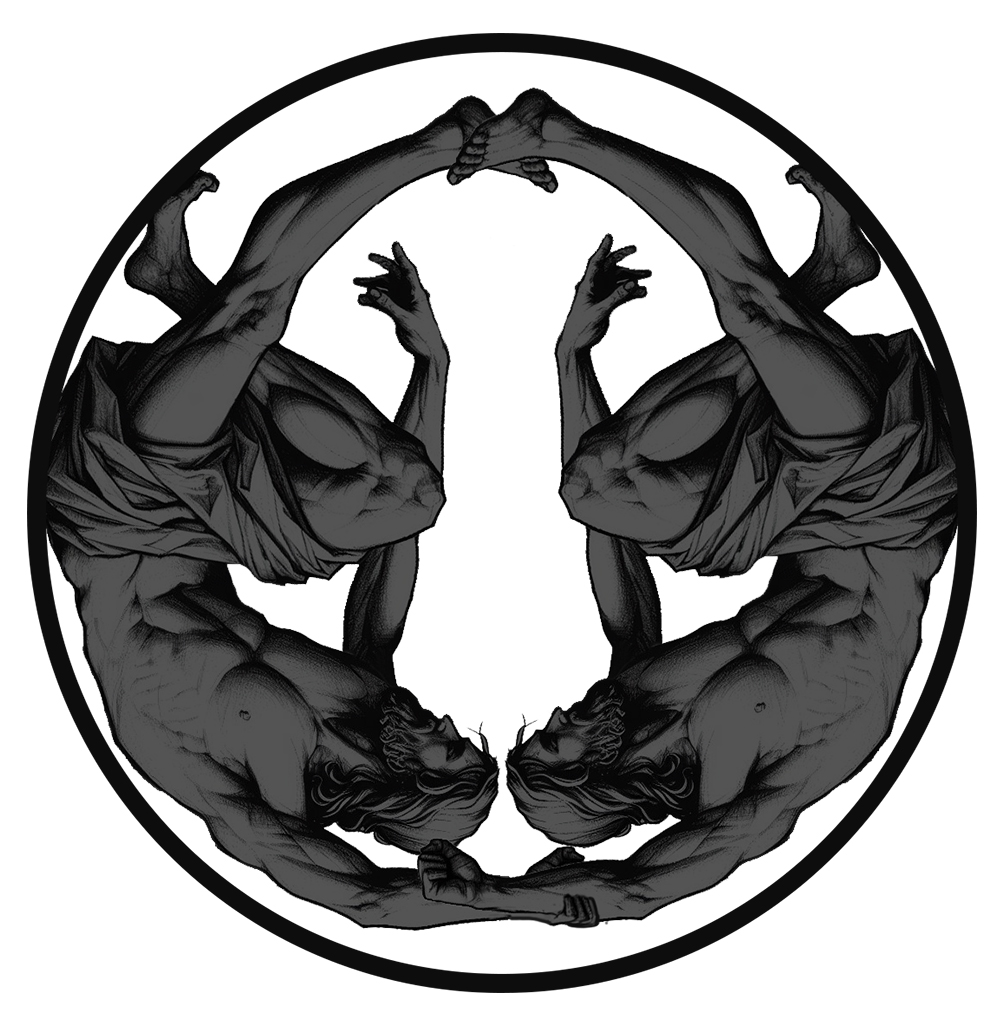
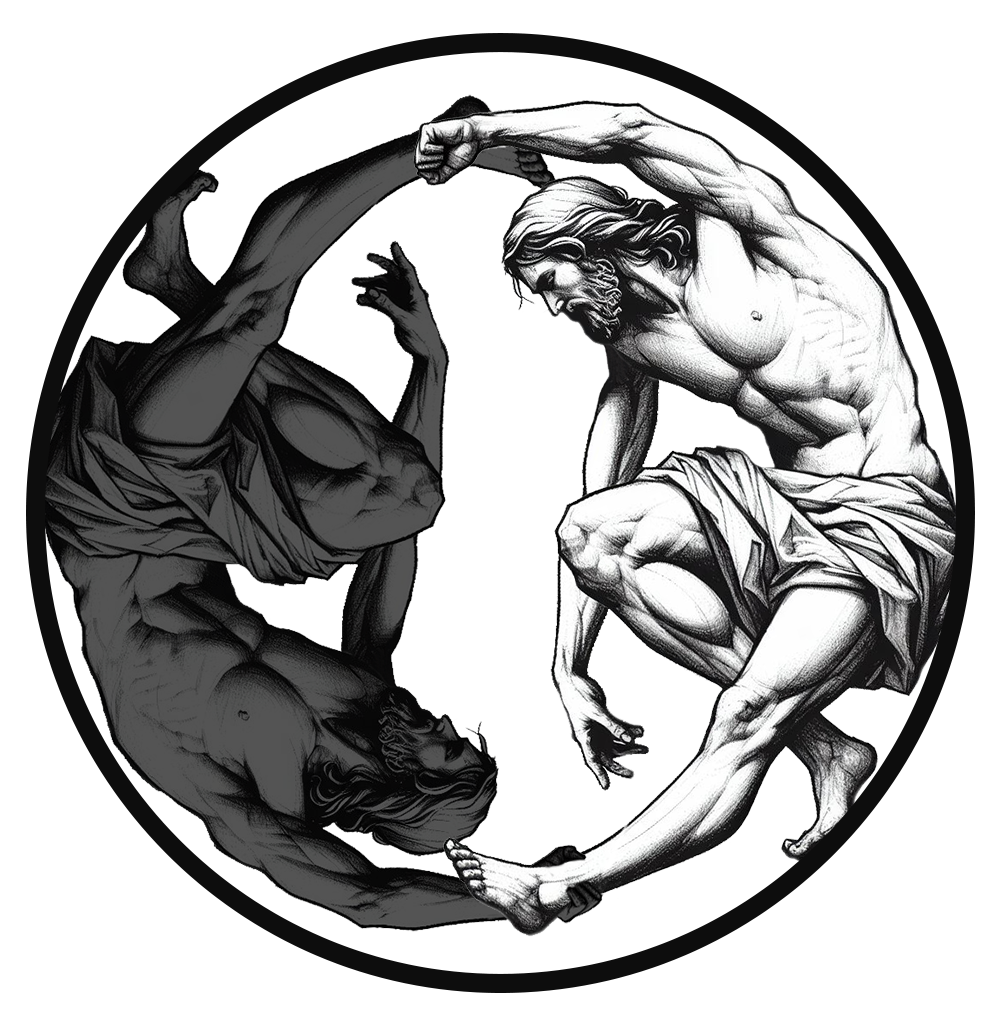
"You must not Let this one Be His own King!"
From out of this one the Man of the Spear kept seeking to set free himself, and the Casters howled, those who are saying, "If you set this one free, you are not a friend of the Dictator in Perpetuity ("Caesar")! Everyone who makes his own self a king, is contradicting the Dictator in Perpetuity!
The Ruling Caesar.
βήματος - step
Therefore the Man of the Spear, he who heard the Logos Ratios, these ones, led outside the Salvation and sat down on a step into a place/position which is called, Stone Pavement, and in Beyond ("Hebrew"), Lofty Place ("Gabbatha").And she was being a preparation of the Pass Over, she was a hour/seasonal time just like a sixth,117c and she is speaking to the Casters, "Behold! the King of Yourselves!"
Therefore those ones howled, Take Up! Take Up! Stake himself! The Man of the Spear is saying to themselves "Will I stake the King of Yourselves?"118 The Arch Priests separated, "We are not holding a king except Dictator in Perpetuity ("Caesar").
The Left Hand takes hold, associates him with themselves
Therefore, at that time, he handed over himself to themselves so that he might be staked. Therefore, they associated the Salvation.
2. take upon oneself, undertake
3. take in pledge
4. Receive by hearing
5. receive by use, admit
II.1 (with accusative of person) associate with oneself as wife, mistress, or adopted son, or partner, or ally
βαστάζων ἑαυτῷ - Bearing to His own self
And he who is carrying the Stake to his own self,119 came out into the one who is spoken 'the Position of the Skull' which is spoken in Hebrew, 'Rolling-Skull,'where they staked himself, and in company with himself two other ones, from this side and from this side and the middle, the Salvation.

Netzer - Nazareth.
"And he has gone out, a rod from the Stump of Jesse, a branch [netser] from out of the roots of himself is bearing fruit." (Isaiah 11:1 RBT)

And the Man of the Spear also wrote/drew a title/punitive tattoo, and he placed on the Stake. And he was being that which has been etched/engraved, Salvation the Protector ("the Nazarene"), the King of the Casters.
The Place of the City
Therefore this one, the Punitive Title, multitudinous of the Casters thoroughly recognized/knew well, because the Place/Position of the City where the Salvation was staked was near, and he was being that which has been written/drawn in Hebrew, in Roman,121 in Greek.
In Hebrew letters.
In Roman letters.
In Greek letters.
Slaves and Criminals: In ancient Rome, criminals, especially slaves, might be branded with a tattoo or physical inscription (such as a titulus) indicating their crime or status. This could be done to mark them for life, so they could not escape identification. For example, a slave who escaped might be marked with the letters "FUG" (for "fugitivus" meaning runaway), or a criminal could be branded with the crime they committed.
Punitive Tattoos: There are references in literature, such as in the Rhetoric of Hermogenes (Rhét. 7.1), that suggest the use of tattoos or physical marks as a form of punishment. In some cases, these marks were meant to visibly brand the individual for life as a reminder of their crime or transgression.
Public Branding: Some ancient societies used public markings as a way to humiliate or ensure compliance. For example, Roman soldiers might have been marked with a titulus on their arms or foreheads to display loyalty or identify them as a part of a particular legion or group.
Therefore the Arch Priests of the Casters kept saying to the Man of the Spear, "Do not write/draw 'The King of the Casters' but rather that that one said I am a king of the Casters.'"
The Man of the Spear separated, What I have written, I have written.
What the Soldiers Made
Therefore the Soldiers, when they staked the Salvation, took hold of the Outer Garments of himself and made four portions, a portion to each soldier, and also the Inner Tunic/Undergarment. But he was being the Inner Tunic, a seamless/one-piece from out of the Above, woven entirely across.Ecumenism: The Soldiers Cast for Their Portion of Herself
Therefore they said toward one another, "Let us not split up himself but let us obtain by casting lots around himself, of whom she will be." so that the Writing might be filled up, she who is saying, "They divided the Outer Garments of myself to their own selves, and upon the Attire/Outfit of myself they cast a lot/allotment!" The Soldiers indeed therefore made these ones!
And they had been standing ready close beside the Stake of the Salvation: the Mother of himself and the Sister of the Mother of himself, Bitter-Rebel, the one of the Thief-of-the-Whole ("Clopas"),120 and Bitter-Rebel the Watchtoweress ("Magdalene").

Behold the Mother of Yourself
Therefore Salvation, he who has perceived the Mother and the Learner, he who has stood close by, him whom he was agape-loving, is speaking to the Mother, "Woman, behold the Son of yourself!"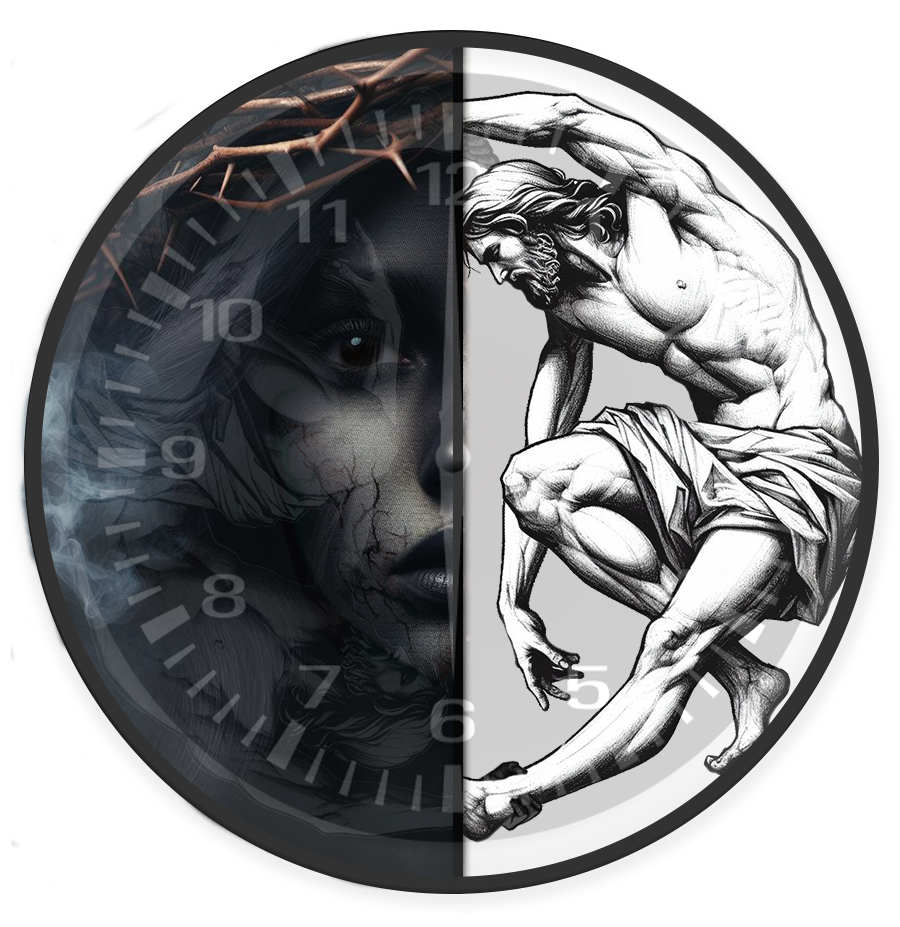
"Woman, behold the Son of yourself!"
Next he is speaking to the Learner, "Behold! the Mother of yourself!" And away from that one, the Hour, the Learner took hold of herself into his Own Ones.
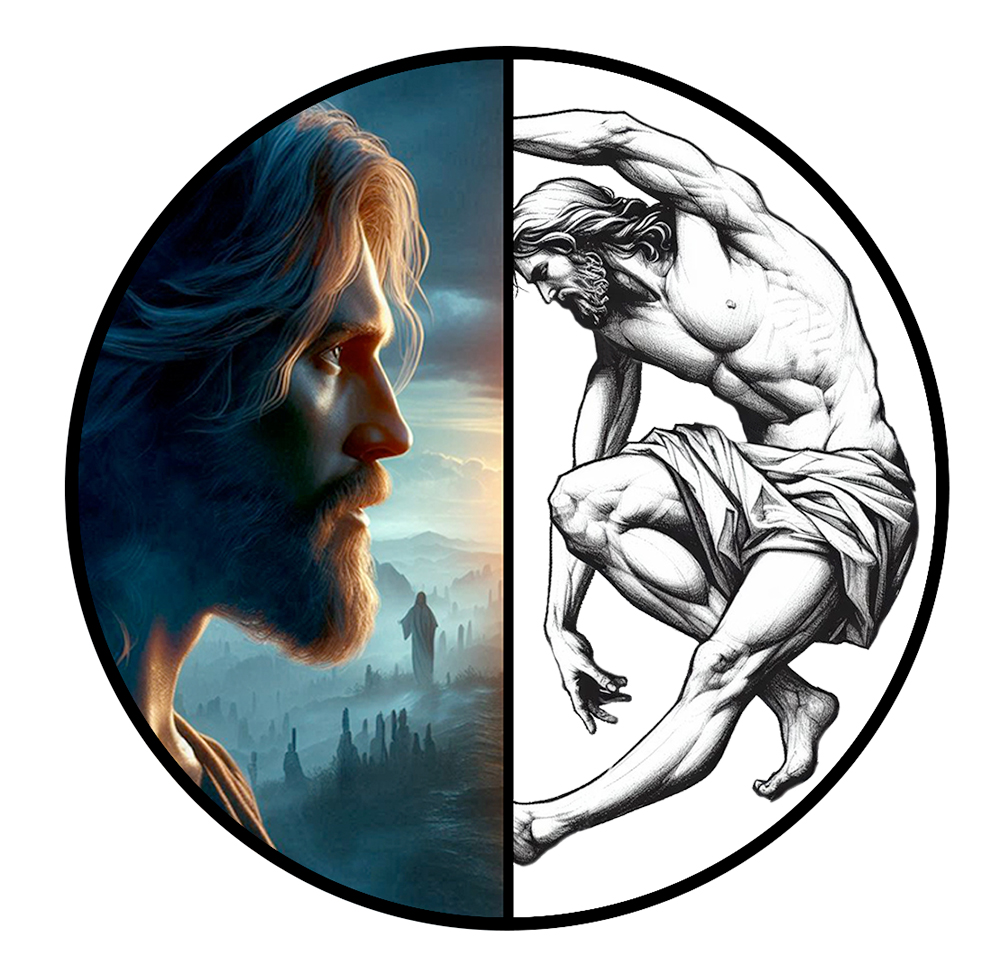
Beyond this, the Salvation, he who has seen that already everyone has been completed, so that she might be made perfect, the Writing, he is saying, "I am thirsting."
A vessel was lying stretched out, full of vinegar. Therefore, those who have set hyssop around a sponge full of the Vinegar, brought toward the Mouth of himself.

"And Strength Within ("Bo-az") is saying to herself, 'At the time of the Meal, draw near here, and you have eaten from out of the Bread-Loaf, and you have dipped a portion of yourself within the Vinegar.' And she is sitting down from the side of the ones who cut short, and he is squeezing herself, a roasted kernel/dishonored one. And she is eating, and she is sevening, and she is remaining over."
(Ruth 2:14 RBT)
"And they are putting poison in the feed of myself, and for the thirst of myself they are making myself drink vinegar!"
(Psalm 69:21 RBT)The Sour Vinegar Finished. Now he has somewhere to lay his head
Therefore at the time when he took hold of the Vinegar, the Salvation said, "She is finished/done!" And he who has reclined the Head, handed over the Spirit.121a
Squeezing the bad portion of her out
Therefore the Casters, since she was a preparation, so that the Bodies within the Inner Cessation would not remain on the Stake, for the Day of that one was mega, they questioned the Man of the Spear so that the Legs [lower body] of themselves should be shattered in pieces and be lifted up.
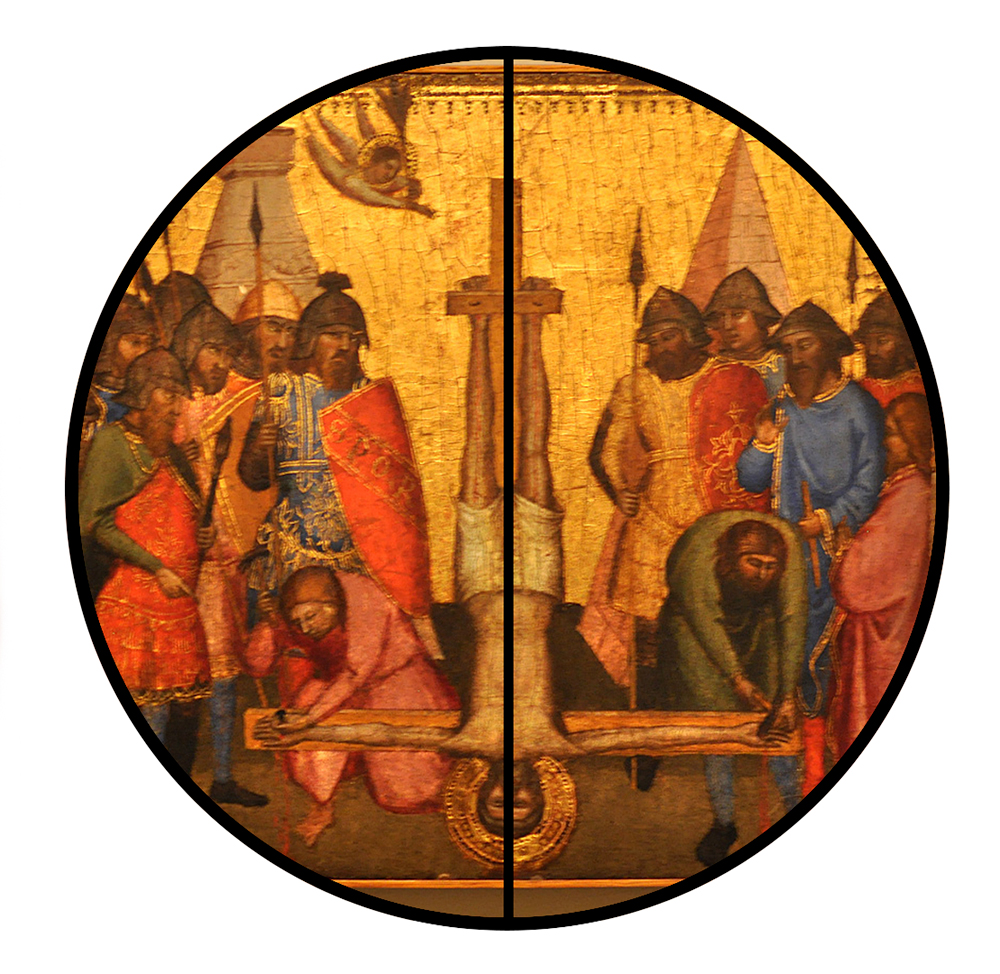
Legs of the body "lifted up" and fractured/factions.
(Jacopo di Cione 1370-71)
Jointly Crucified
Therefore the Soldiers came and indeed they broke down in pieces the Legs of the First One and of the Other One, the one who has been jointly-crucified/staked to self.ὡς εἶδον ἤδη αὐτὸν: Did he die? The Soldiers thought so...
And those who have come against the Salvation, even as they already perceived himself he who is dead, they did not break down to pieces the Legs of himself.121bBut one of the Soldiers with a spear-head pricked the Rib of himself and she came out immediately, blood and water.
And the one who has perceived has borne witness, and a true/real one of himself, she is the Testament, and that one knows that he is speaking true things, so that you, yourselves may also trust!
אחת מהנה לא נשברה - one from themselves has not been broken (Psa. 34:20)
For these things have become so that the Writing, she may be filled up, "A bone/essence of himself, she will not be broken." And another writing, she is speaking backward, "They will look into him whom they have stung out." And beyond thing things, He Adds ("Joseph") away from High Place, he who is a learner of the Salvation but who has been concealed because of the Fear of the Casters, questioned the Man of the Spear, in order that he might lift up the Body of the Salvation, and the Man of the Spear gave way/turned over. Therefore he came and lifted up the Body of himself.And Conqueror of the People also came, the one who came toward himself of night, the First One, he who is carrying a compound of myrhh and aloes like a hundred Roman-pounds ("litras").
Wrapping the Body in Linen Cloths
They took hold therefore of the Body of the Salvation, and they bound self in linen cloths with the Spices just like a custom is to the Casters to prepare for burial.Seth: A New Memorial, Replaced
And he was being a garden within the Position where he was staked, and within the Garden he was being a new memorial, within which no one was yet being him who was placed.Therefore in that place, because of the Preparation of the Casters, because the Memorial was being near at hand, they placed the Salvation.
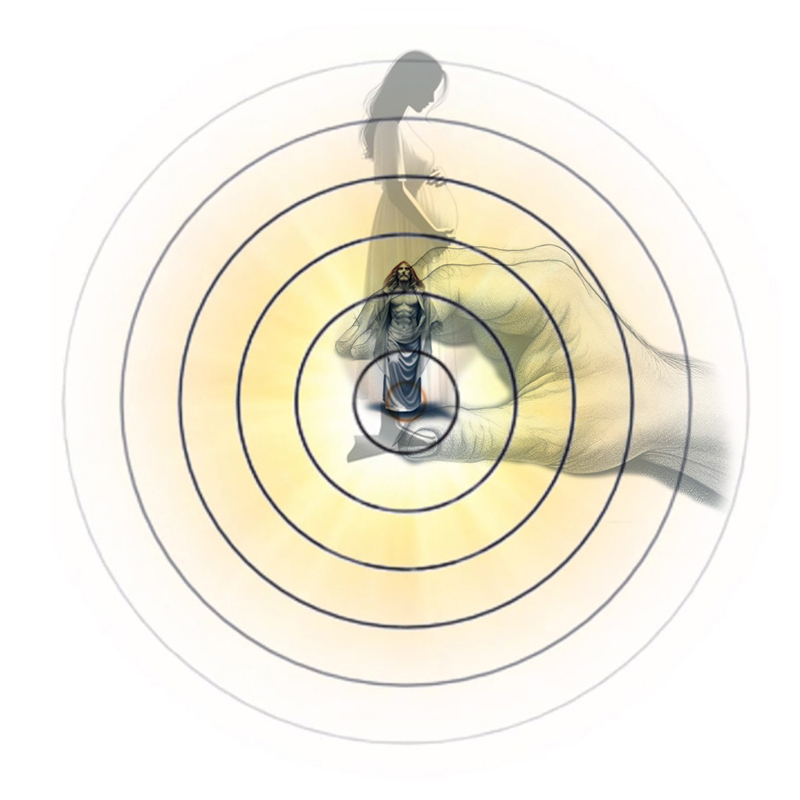
Setting the First Stone upon herself.

Footnotes
Strongs Greek #G2007 ἐπιθήσομεν (epithésomen) with dative, and in the context of assaulting, attacking.
The more straight forward word for "setting/placing/laying" something is τίθημι tithémi (See #G5087, Logeion τίθημι)
The verb ἐπιθήσομεν (epithésomen) in ancient Greek literature encompasses several nuanced meanings:
-
Act of placing or laying upon: Primarily used to denote placing or laying something upon something else, such as offerings on an altar (Od. 21.267; Ar. Nu. 426), setting meats on a table (Od. 1.140), or placing objects on a chariot (Il. 24.264).
-
Metaphorical or symbolic usage: It is also employed metaphorically to signify imposing or setting burdens, grievances, or fates upon individuals (Il. 24.589; Od. 24.419; AP 7.505).
-
To impose or inflict: Used in legal contexts to denote the imposition of penalties, judgments, or punishments (Od. 2.192; Hdt. 1.120, 144; Pl. Lg. 838c).
-
To lay or throw oneself upon: Followed by the dative of a person, indicating an attack or assault (Acts 18:10; Exodus 21:14; Exodus 18:11; 2 Chronicles 23:13), as well as in secular writings.
- Metaphorical burdens or fates: Applied metaphorically to denote the imposition of grievances, burdens, or fates upon individuals (Il. 2.39; Od. 15.234; X. Lac. 10.7).
What Time Is It?
On John 19:14—“ἦν δὲ παρασκευὴ τοῦ πάσχα, ὥρα ἦν ὡς ἕκτη” (“And it was the Preparation Day of the Passover; it was about the sixth hour”)—there exists a long-standing scholarly difficulty in reconciling this Johannine time statement with the Synoptic accounts that situate the crucifixion at the third hour (Mark 15:25) and darkness at the sixth hour (Mark 15:33; Matthew 27:45; Luke 23:44). This "extreme difficulty" is frequently acknowledged (see Pulpit Commentary on John 1:39), and has led critics to argue that all John’s notices of time might reflect the Roman method of counting hours from midnight to noon and from noon to midnight, thereby aligning John with the Synoptic narratives. Yet such efforts to harmonize these “extreme difficulties” proceed from an anachronistic imposition of modern linear time concepts—imagining time as a sequence of discrete hours measured uniformly and mechanically.
In ancient Hebraic thought, however, “hour” (ὥρα) functioned not merely as a quantitative unit but as a theological locus of divine disclosure—a sign of Aonic Time (cf. John 4:6: “ὥρα ἦν ὡς ἕκτη” and John 19:14: “ὥρα ἦν ὡς ἕκτη”), which collapses linear chronology into a Möbius-like prophetic simultaneity: past, present, and future coalesce within a single revelatory moment. This concept parallels OT expressions such as “the day of that one” (ביום ההוא), denoting an eschatological time—“in the day of Himself”—attested in Genesis 15:18 and Isaiah 7:20.
Thus, John’s usage of “ὥρα” is not an empirical timestamp but a sacramental temporal marker, merging the Passover preparation with the divine hour of judgment and redemption (cf. John 2:4; 12:23; 17:1). The sixth hour, in this context, deliberately overlaps with the darkness hour in the Synoptics, demonstrating that the Passion is not confined to a historical timeline but unfolds within eternal time, wherein the crucifixion hour recapitulates creation, exodus, and the final judgment.
This insight reveals why modern scholars, seeking to harmonize or literalize these time references, have often failed: they neglect the Johannine recursivity that resists linear sequence, thereby missing the writer’s deeper intent to present the crucifixion as a cosmic, timeless event.
Greek σταυρώσω. I will stake down / crucify.
Thayer's Greek Lexicon: STRONGS NT 4717: σταυρόω σταυρόω, σταυρῷ; future σταυρώσω; 1 aorist ἐσταυρωσα; passive, present σταύρομαι; perfect ἐσταύρωμαι; 1 aorist ἐσταυρωθην; (σταυρός,
This could be either Future or Subjunctive, as they are both spelled the same.
Let's break down the difference in syntax between the future active indicative form and the aorist subjunctive active form:
-
Future Active Indicative - I will stake-down:
- "σταυρώσω" (staurōsō) is the first person singular form of the future tense.
- The future tense indicates an action that will occur at a later time, in this case, the action of "crucifying."
- The indicative mood indicates a statement of fact or certainty. In this form, the speaker is declaring their intention to perform the action of crucifying.
-
Aorist Subjunctive Active - I may stake-down:
- The aorist tense generally refers to a completed action in past time, though it can also express undefined or unspecified action.
- The subjunctive mood typically expresses possibility, potentiality, or uncertainty.
- "σταυρώσω" (staurōsō) can indeed be the first person singular form of the aorist subjunctive active
- In this case, the aorist subjunctive active form would express a hypothetical or potential action of crucifying, often used in conditional or indirect statements.
The phrase "βαστάζων ἑαυτῷ" (bastazōn heautō) translates to "bearing to his own self" or "carrying to himself" or with the accusative "the Stake": bearing the stake to his own self.
- "βαστάζων" (bastazōn) is the present active participle form of the verb "βαστάζω" (bastazō), which means "to carry" or "to bear."
- "ἑαυτῷ" (heautō) is the dative form of the reflexive pronoun "ἑαυτός" (heautós), which means "to his own self."
The whole phrase then, "βαστάζων ἑαυτῷ τὸν σταυρὸν" (bastazōn heautō ton stauro) would be:
"Carrying to his own self the stake."
Because ἑαυτῷ is not genitive, a translation of "carrying his own cross/stake" is therefore, for lack of any better way to put it, a lie. It is not "the Cross of himself" but rather "the Cross to himself."
"in Roman" or "in the Roman language" is more accurate than "in Latin" as a translation of Ῥωμαϊστί (Rhōmaïstí). While Ῥωμαϊστί can refer to the Latin language spoken by the Romans, it also encompasses the broader cultural and linguistic context of Roman civilization. Therefore, "in Roman" or "in the Roman language" captures the full meaning of Ῥωμαϊστί.
Strongs #2832, Κλωπᾶς. Klopas. A dubious etymology to many scholars, being a rare name. Some have suspected it was made up, which is also plausible since there are numerous words made up by NT authors to express specific meanings. The meaning is derived from the Greek root Κλo, from which comes "klepto" meaning to steal. And πᾶς which means "all/whole." The idea of Mary being married to some man named "a burglar of all" has led many to think it highly unlikely.
He Took Hold
Strong's #G2983, ἔλαβεν. An ironic word to use here, to be sure. The scholars defined it:
I. to take, i. e.:
1. to take with the hand, lay hold of, any person or thing in order to use it: absolutely, where the context shows what is taken, Matthew 26:26; Mark 14:22; (τόν) ἄρτον, Matthew 26:26; Acts 27:35; τό βιβλίον, Revelation 5:7-9 (see Buttmann, and Winer's Grammar, as above)
If his hands are nailed to a cross beam, there is a profound inconsistency with this word. Or maybe the author of the story smoking something?
Strong's #G2827. The verb "κλίνω" in Ancient Greek can also be used to mean "to recline," particularly in the sense of lying down or positioning oneself in a resting or reclining posture. This usage stems from the idea of "bending" or "inclining" the body, typically in a way that is horizontal or at an angle, which aligns with how we think of reclining. There is already NT precedent/context for it:
"but the Son of the Man is not holding in the place where he may recline the Head."
(Matthew 8:20 RBT)
In the context of reclining, "κλίνω" implies that a person is bending their body in such a way that they are no longer sitting upright but rather lying back or at an inclined angle. This could apply to various situations, such as reclining on a couch, in a bed, or during a meal (for example, when people reclined at tables in ancient Greece during banquets).
For example, the verb could be used in the following way:
- "Ἐκείνη ἐκλίνετο ἐπὶ τοῦ κλίνους."
("She reclined on the couch.")
Here, "ἐκλίνετο" is a form of "κλίνω", indicating the action of reclining or lying down.
In Ancient Greek culture, especially during symposia (drinking parties), reclining was a common practice. Participants would lie back on couches in a reclining position while eating and drinking, which is another reason why "κλίνω" came to be associated with reclining.
So, when "κλίνω" is used to mean "recline," it carries the idea of a body being bent or inclined into a position of rest, often lying down or leaning back at an angle.
Did he die? The Soldiers thought so...
This phrase in John 19:33, ὡς εἶδον ἤδη αὐτὸν τεθνηκότα, has serious syntactic ambiguity owing to the variable position of the adverb ἤδη ("already") and the usage of a participle τεθνηκότα ("one who is dead") instead of an aorist indicative: ἔθανον — "He died". Is John not conscious of this? Surely he is. But why? Nevermind, later copies and manuscripts have "corrected" the ambiguity for us.
Manuscript evidence shows variation between readings as ὡς εἶδον ἤδη αὐτὸν τεθνηκότα (Nestle 1904, Westcott-Hort 1881, Tischendorf 8th ed.) and ὡς εἴδον αὐτὸν ἤδη τεθνηκότα (Byzantine Majority Text 2005, Greek Orthodox Church, Textus Receptus). This difference affects whether the emphasis lies on the act of perceiving ("as they already perceived him to be dead") or on the state of being dead ("as they saw him already dead"). The flexible word order characteristic of Koine Greek permits such semantic variance. The presence of these variants in the textual tradition suggests scribes were aware of the ambiguity and, in later copies, altered the word order to clarify meaning. Thus, the textual history reflects a tension between an epistemic nuance—perceiving as though dead—and a more straightforward assertion of death’s actuality.
This nuance is consistent with similar uses of ὡς and ἤδη in the New Testament, where the adverb may either modify the perception or the predicate, depending on its syntactic placement (cf. Matt 6:29; 7:29; John 11:33). The variation exemplifies scribal attempts to resolve interpretive ambiguity in a theologically sensitive passage. John reports the perception of the Soldiers, what about his own understanding?
Where is the certainty, John?
The phrase ὡς εἶδον ἤδη αὐτὸν τεθνηκότα, due to its syntactic ambiguity, does not unequivocally convey the certainty of death. The construction can be read as “as they already perceived him dead” but also allows for an epistemic shading—“as if they saw him already dead” or “perceiving as though he was dead”—which introduces a degree of subjectivity or provisionality rather than a definitive statement. This nuanced ambiguity would be insufficient for communicating absolute certainty about death to a contemporary reader. Furthermore, John uses τεθνηκότα which is a participle "he who is dead", rather than a more definitive ἔθανον "he died" which would leave no cause for question. But instead we have "the soldiers already perceived him as dead."
But this, most certainly, does not help in the construction of theological dogmas of death.
Ok, I'll just go ahead and move around the word order a little bit...no one will notice!
Consequently, later scribal changes that reposition ἤδη or adjust word order are clearly motivated by the desire to try to clarify or strengthen the assertion of death’s actuality. The phrase ὡς εἶδον ἤδη αὐτὸν τεθνηκότα (“as they already saw/perceived him to be dead”) conveys a perceptual judgment or an assumption based on appearance, rather than an objective or irrefutable confirmation of death. From an evidentiary standpoint, this formulation would be considered insufficient or weak testimony for the following reasons:
-
Grammatically, this clause reports a subjective visual assessment (ὡς εἶδον), not a forensic determination.
-
The construction ὡς + indicative, especially with verbs of perception like εἶδον, often introduces a clause that reflects the perspective or judgment of the subject, not necessarily objective fact.
-
Implication for narrative reliability: The phrase suggests the narrator reports the soldiers’ judgment rather than asserting a settled, objective fact.
In other words, John himself never said he died. What he did say, was that the Soldiers perceived him as dead.
The RBT translates the original, authoritative texts as they were originally penned, so all may read the ambiguity, and decide for themselves.